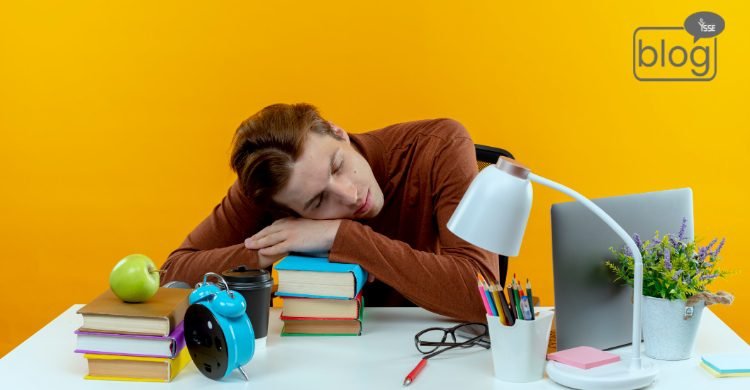Who isn’t familiar with the meme that humorously highlights risking life, career, and education for a more 15 minutes of additional sleep? For many, that extra hour of sleep feels like our personal happy hour. However, challenges arise when the temptation to sleep interferes with focused studying for an upcoming exam.
Why are we feel sleepy? It happens due to the Melatonin hormone in our body which stimulates sleepiness. Secretion of Melatonin increases during the evening and night and pokes us to sleep.
According to research, adults should get at least 7 hours of sleep. So why do we feel sleepy even after 8 hours of sleep? The causes include if we have poor quality of sleep, if lifestyles include stress, unhealthy diet, or also can be caused by lack of sleep, or any medical condition like Narcolepsy or REM sleep.
Adults usually feel sleepy during the daytime and at midnight. Excessive daytime sleepiness is prevalent. It happens as a result of sleep apnea, narcotic medication, or any other cognitive condition. Many disorders lead to excessive sleep.
The reasons for excessive sleepiness are not definite. It varies from person to person according to their age, lifestyle, habits and underlying causes.
Excessive sleep disrupts the natural sleep cycle, leading to not only fatigue but also heightened irritability and various associated issues.
What to do to avoid falling asleep while studying –
- Optimal study hours are in the morning, minimizing disruption to the sleep cycle; however, individual concentration levels may differ.
- Study in a group.
- Keep moving and always sit up straight.
- There should be proper lighting and do not study in a bedroom.
- Maintain a healthy diet and remember to stay hydrated.
- Maintain a healthy diet and stay hydrated during study sessions.
- Splash your face with cold water.
- If one feels tired and nothing enters the brain for the last 15 minutes, it may be worth switching tasks or topics.
- Exercise daily to increase energy and remove fatigue.
- Practice the use of maps, cards, or any other visual hand notes.
- Try to relate the topic with real life, visualize and make your own example.
- Remember practice makes one perfect. Regular practice enhances proficiency; adopt a consistent study routine.
- Do not study in bed. It causes lack of motivation and concentration.
- Use a sturdy table and chair for a comfortable study environment.
- Study while standing and walk through the room.
- Although caffeine blocks the adenosine receptor to keep you from feeling drowsy, try to avoid coffee.
- Many find it hard to focus on studying at night. It is due to the dim environment. But it differs from one to another. So, Recognize individual preferences regarding study time—morning or night.
- After reading for 25 to 90 minutes you must take a break. Too much study causes burnout.
- Many use night time for physics and chemistry And use the morning time for chemistry and biology theory. They found it to be the best. That’s why, tailor your study schedule based on subject preferences and difficulty levels.
- Sugary or any other energy drinks must be avoided.
A frequently asked question is, “What’s the optimal time to wake up and kick-start the day?” Many believe that the ideal time falls between 6 to 7 am, aligning seamlessly with the natural beauty of sunrise.
Sleep is essential for the proper functioning of one. Studies show that it not only impacts the function but also helps one to recall, impact, realize and gives one the ability to solve a problem. It also should be noted that teenagers need more sleep (about 8 to 10 hours) as they go through emotional and physical growth which is very rapid.
To read more blogs like this, click here.
Writer
Afsana Khanom Monika
Intern, Content Writing Department
YSSE

